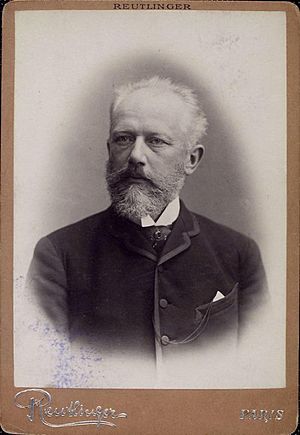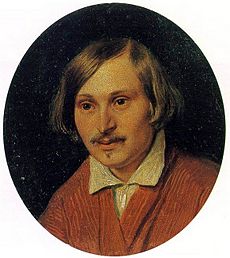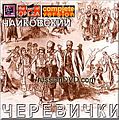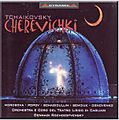Cherevichki facts for kids
Quick facts for kids Cherevichki |
|
|---|---|
| by Tchaikovsky | |

Tchaikovsky in 1888
|
|
| Native title | Russian: Черевички |
| Librettist | Yakov Polonsky |
| Language | Russian |
| Premiere | 31 January 1887: Bolshoi Theatre in Moscow |
Cherevichki (which means The Slippers in English) is a fun and magical opera by Pyotr Ilyich Tchaikovsky. An opera is a play where the story is told mostly through singing, with music played by an orchestra. This opera has 4 acts and 8 scenes. Tchaikovsky wrote it in 1885 in Russia.
The story for Cherevichki comes from a famous tale called "Christmas Eve" by Nikolai Gogol. This story was part of a collection called Evenings on a Farm Near Dikanka. The words for the opera, called the libretto, were written by Yakov Polonsky. Cherevichki is actually a new version of an earlier opera by Tchaikovsky called Vakula the Smith. The first time Cherevichki was performed was in 1887 in Moscow.
Contents
How the Opera Was Made
Tchaikovsky wrote Cherevichki between February and April 1885. He was at a place called Maidanovo in Russia. Both Vakula the Smith and Cherevichki used the same story written by Yakov Polonsky. This story was first meant for another composer, Alexander Serov, but he passed away before he could use it.
Tchaikovsky made changes and added new parts for this second version of the opera. He worked with Nikolay Chayev on these updates. The main musical ideas stayed the same as in Vakula the Smith. Tchaikovsky wanted to make the opera better known and more popular. He wrote in a letter that he wanted to help it "out of the river of oblivion."
The changes mostly made the music simpler in some places. Tchaikovsky also added a new song for the character Vakula to make the emotional parts of the opera deeper. This song was about Vakula's feelings for Oksana. Other additions, like a song for the School Teacher, made the opera more lively and fun. Tchaikovsky also changed how the chorus scenes were put together.
First Performances
The very first performance of Cherevichki happened on January 31, 1887. It was at the Bolshoi Theatre in Moscow. Tchaikovsky himself was the conductor for this show, which was his first time conducting an opera. A. I. Bartsal directed the stage, and K. F. Valts designed the scenery.
For most of the 20th century, this opera was not performed very often. It was mostly shown again in Russia and the USSR. It had its first performance in Poland in 1952. The Wexford Festival Opera in Ireland put on five new shows in October 1993.
The opera was first seen in the United Kingdom at Garsington Opera on June 26, 2004. Later, it was performed at The Royal Opera House Covent Garden on November 20, 2009. One of these later shows was even broadcast for people to watch at home.
Who Are the Characters?
Here are the main characters in Cherevichki and the types of voices they sing with:
| English Name | Voice Type | First Performance Cast (1887) |
|---|---|---|
| Vakula, a smith | tenor (a high male voice) | Dmitri Usatov |
| Solokha, Vakula's mother, a witch | mezzo-soprano (a medium-low female voice) | A. V. Svyatlovskaya |
| Chub, an elderly Cossack | bass (a low male voice) | Ivan Matchinsky |
| Oksana, Chub's daughter | soprano (a high female voice) | Maria Klimentova-Muromtseva |
| A devil from Hell, a fantastic character | bass | Bogomir Korsov |
| Schoolmaster | tenor | Aleksandr Dodonov |
| Pan Golova, Chub's crony | bass | V. S. Streletsky |
| Panas, Chub's crony | tenor | P. N. Grigoryev |
| His Highness | bass | Pavel Khokhlov |
| Master of Ceremonies | bass | R. V. Vasilyevsky |
| Attendant | tenor | |
| Old Cossack | bass | |
| Wood Goblin | bass | |
| There are also many other people in the opera, like young men and women, older people, musicians, water spirits (rusalki), wood spirits, and people at the royal court. | ||
The Music and Instruments
The music for Cherevichki is played by a large orchestra. Here are some of the instruments used:
- Strings: Violins (first and second), Violas, Cellos, Double Basses. These are instruments played with a bow.
- Woodwinds: Piccolo, Flutes, Oboes, Clarinets, Bassoons. These instruments are played by blowing air through them.
- Brass: Horns, Trumpets, Trombones, Tuba. These are metal instruments played by buzzing your lips into a mouthpiece.
- Percussion: Timpani (kettledrums), Triangle, Tambourine, Cymbals, Bass Drum. These instruments make sound when hit or shaken.
- Other: Harp.
- On/Offstage: Sometimes, a wind band plays from off the stage.
Some parts of the opera were also arranged by Tchaikovsky for voices with piano, or for two pianos playing together.
What Happens in the Opera?
The opera starts with an Overture, which is a piece of music played before the curtain opens.
Act 1 This act has two scenes. In the first scene, we meet Solokha, a witch, and a Devil. A snowstorm happens. In the second scene, we meet Oksana and Vakula. There are songs and scenes where they talk and sing together. The act ends with Oksana, Vakula, and a choir.
Act 2 This act also has two scenes. It starts with an Entr'acte, which is music played between acts. In the first scene, Solokha meets different characters like Pan Golova, a Deacon, and Chub. There's a big scene with five characters singing together. Vakula also sings a sad song. The second scene has a big choir, a special song about the "Cherevichki" (slippers), and ends with Oksana, Vakula, Chub, and the choir.
Act 3 This act has three scenes and starts with another Entr'acte. In the first scene, there's a chorus of Rusalkas (water spirits) and a song by Vakula and the Devil. The second scene features the Devil, Vakula, and an Old Cossack. The third scene is grander, with a Polonaise (a type of dance), songs by His Highness, a Minuet (another dance), and a scene with Vakula and Catherine II (the Empress). There are also Russian and Cossack dances.
Act 4 This final act has two main parts. First, Solokha and Oksana sing a duet together. Then, the opera ends with a big scene involving Oksana, Chub, Pan Golova, Panas, Solokha, Vakula, and the choir.
Other Operas Like This
The story "Christmas Eve" by Nikolai Gogol has inspired more than one opera!
- Tchaikovsky wrote Vakula the Smith in 1874, which he later revised into Cherevichki.
- Another famous Russian composer, Rimsky-Korsakov, also wrote an opera based on the same story called Christmas Eve in 1895.
So, Rimsky-Korsakov's Christmas Eve, Tchaikovsky's Vakula the Smith, and Cherevichki all tell the same magical story by Gogol.
Listen to Cherevichki
You can listen to recordings of Cherevichki to hear the music. Here are some of them:
- A recording from 1948, conducted by Aleksandr Melik-Pashayev, with the Bolshoi Theatre Orchestra and Chorus.
- A recording from 1973 by Fedoseyev and other singers.
- A recording from 2000, conducted by Gennady Rozhdestvensky, with the Cagliari Lyric Theater Orchestra and Chorus.
- A recording from 2004 by Howarth and other singers.
- A DVD recording from 2009 of a performance at the Royal Opera House.
There is also an orchestral suite (a collection of music from the opera) called "Les Caprices d'Oxane." It was arranged by Constantine Saradjeff and recorded in 1953.
See also
 In Spanish: Cherevichki para niños
In Spanish: Cherevichki para niños
 | Charles R. Drew |
 | Benjamin Banneker |
 | Jane C. Wright |
 | Roger Arliner Young |




